Yesterday’s Double Ten National Day celebration in front of the Presidential Office Building in Taipei was heavy on diversity, heroes and military personnel compared with last year’s event.
A parade of “heroes of wind and rain” followed President Tsai Ing-wen’s (蔡英文) national day address, spotlighting those involved in disaster relief operations.
While not a full-scale military parade, the march featured a substantial number of military personnel and equipment compared with the brief military fly-over that followed former president Ma Ying-jeou’s (馬英九) speech last year.
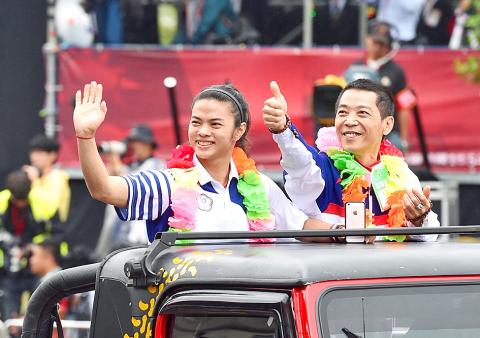
Photo: Peter Lo, Taipei Times
The cloudy skies over downtown Taipei were filled with the thunder of a steady line of helicopters from the military and Ministry of the Interior fleets, which were immediately followed by a drive-by by rows of camouflaged military vehicles carrying soldiers from disaster relief units, military logistics vehicles and other equipment.
Police motorcycles and fire trucks brought up the rear as audience members waved banners thanking service members.
Medal-winning athletes from the Rio de Janiero Olympic Games — weightlifters Hsu Shu-ching (許淑淨) and Kuo Hsing-chun (郭婞淳) and archers Lei Chien-ying (雷千瑩) and Lin Shih-chia (林詩嘉) — drew prolonged applause as they rode by in jeeps.
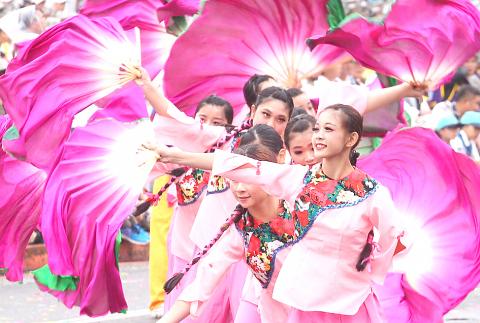
Photo: CNA
Baseball legend Chen Chin-feng (陳金鋒) led the singing of the national anthem along with members of Dongyuan Elementary School’s internationally recognized Little League baseball team.
The Ministry of National Defense’s Honor Guard and Joint Military Marching Band maintained their tradition of annual performances.
Another nod to tradition was the triple ceremonial bow to a portrait of Republic of China (ROC) founding father Sun Yat-sen (孫逸仙) that was superimposed over the national flag.
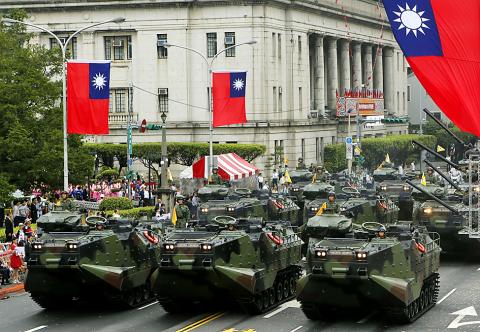
Photo: Ritchie B Tongo, EPA
There was also the traditional address by an overseas Chinese representative, even as the nation’s ethnic diversity — as opposed to ethnic Han nationalism — received greater emphasis.
The opening act featured two bands performing songs in several languages: Hoklo (commonly known as Taiwanese), Hakka, Puyuma and Mandarin Chinese.
The emphasis on diversity was also apparent in the coloring of the front stage, which was painted in a rainbow pattern rather than the traditional red, white and blue colors of the national flag.
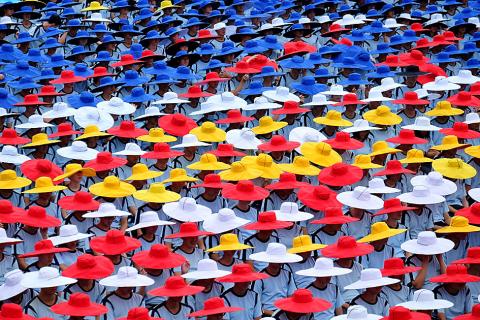
Photo: Sam Yeh, AFP
There were also several small changes, such as the hostesses who showed the dignitaries to their seats wearing different colored skirts instead of the traditional red qipao (旗袍) and the “national day hats” (國慶帽) worn by audience members, when seen from above, formed a mosaic depicting a Formosan black bear instead of the traditional ROC imagery.
A drive-past by Taoyuan borough wardens on zero-emission scooters, performances by the cheerleadering squads from baseball teams and students from several high schools and colleges rounded out the almost three-hour show.
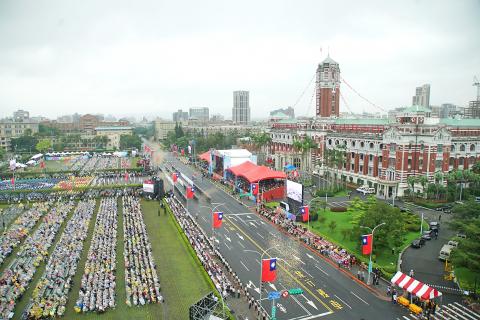
Photo: CNA

SECURITY: As China is ‘reshaping’ Hong Kong’s population, Taiwan must raise the eligibility threshold for applications from Hong Kongers, Chiu Chui-cheng said When Hong Kong and Macau citizens apply for residency in Taiwan, it would be under a new category that includes a “national security observation period,” Mainland Affairs Council (MAC) Minister Chiu Chui-cheng (邱垂正) said yesterday. President William Lai (賴清德) on March 13 announced 17 strategies to counter China’s aggression toward Taiwan, including incorporating national security considerations into the review process for residency applications from Hong Kong and Macau citizens. The situation in Hong Kong is constantly changing, Chiu said to media yesterday on the sidelines of the Taipei Technology Run hosted by the Taipei Neihu Technology Park Development Association. With

CARROT AND STICK: While unrelenting in its military threats, China attracted nearly 40,000 Taiwanese to over 400 business events last year Nearly 40,000 Taiwanese last year joined industry events in China, such as conferences and trade fairs, supported by the Chinese government, a study showed yesterday, as Beijing ramps up a charm offensive toward Taipei alongside military pressure. China has long taken a carrot-and-stick approach to Taiwan, threatening it with the prospect of military action while reaching out to those it believes are amenable to Beijing’s point of view. Taiwanese security officials are wary of what they see as Beijing’s influence campaigns to sway public opinion after Taipei and Beijing gradually resumed travel links halted by the COVID-19 pandemic, but the scale of

A US Marine Corps regiment equipped with Naval Strike Missiles (NSM) is set to participate in the upcoming Balikatan 25 exercise in the Luzon Strait, marking the system’s first-ever deployment in the Philippines. US and Philippine officials have separately confirmed that the Navy Marine Expeditionary Ship Interdiction System (NMESIS) — the mobile launch platform for the Naval Strike Missile — would take part in the joint exercise. The missiles are being deployed to “a strategic first island chain chokepoint” in the waters between Taiwan proper and the Philippines, US-based Naval News reported. “The Luzon Strait and Bashi Channel represent a critical access

Pope Francis is be laid to rest on Saturday after lying in state for three days in St Peter’s Basilica, where the faithful are expected to flock to pay their respects to history’s first Latin American pontiff. The cardinals met yesterday in the Vatican’s synod hall to chart the next steps before a conclave begins to choose Francis’ successor, as condolences poured in from around the world. According to current norms, the conclave must begin between May 5 and 10. The cardinals set the funeral for Saturday at 10am in St Peter’s Square, to be celebrated by the dean of the College